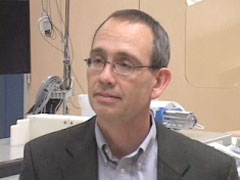$23 Million Awarded for Health Research
By Stephanie Roberts
Two multi-institutional research teams led by scientists at Sunnybrook Health Sciences Centre were awarded $23 million from the Ontario government for work that will position the province at the apex of innovation in the development of minimally invasive image-guided tools and therapies to treat urgent, often fatal, health problems, particularly cardiovascular disease.
Minister of Research and Innovation John Wilkinson made the announcement today at Sunnybrook Research Institute, with MPP for Don Valley West, Kathleen Wynne.
“Don Valley West is home to some of the best research talent in the world working in state-of-the-art facilities,” said Wynne. “I am pleased that we’re supporting this world-class health research and helping to attract and retain leading scientists at Sunnybrook, creating a stronger community, better health outcomes and more prosperity for all Ontarians.”
“To ensure Ontario families can compete and win in the global economy, our government is investing in research and innovation and the skills and knowledge of our people today,” Wilkinson said. “The strong partnerships among our top researchers, global business leaders and government will help provide Ontarians with better health care services, a higher quality of life and more opportunities for success.”
Funding will come from the ministry’s Ontario Research Fund, Research Excellence program. Dollar for dollar, the $23 million investment from Ontario is matched by the private sector. A main focus of the program is on advancing commercialization efforts.
Together, the two Ontario-wide programs of research led by Sunnybrook gather 63 researchers from 10 institutions, and bring into this fold 30 private companies, all with one shared aim: to speed promising medical devices and therapies into the health care market and thus to patients.
“Significant government investments in research such as this helps build a healthy future for the province and ensure Ontario is able to compete globally in the knowledge economy,” said Barry McLellan, Sunnybrook’s President and CEO. “I am personally proud of our scientists. Our Research Institute has more than tripled in size in the last five years to become one of the largest in Canada. These grants will allow our research teams to take giant strides forward in improving the health of our patients and achieve our vision of transforming health care.”
Dr. Michael Julius, Vice-President of Research at Sunnybrook, who presided at the announcement, thanked the minister for the award. “We are delighted with the ministry’s announcement,” said Dr. Julius, “This investment recognizes our faculty’s internationally competitive stature, and validation of our goal to achieve a seamless integration of research with clinical care. It will support our ongoing commitment to invent the future of health care and get the best care to our patients faster. This is one of our proudest moments.”
The project “Imaging for Cardiovascular Therapeutics,” led by Dr. Graham Wright, director of the Schulich Heart Research Program at Sunnybrook, will receive $14.5 million from the province, matched in full by industry investment. This consortium, the only one of its kind in Canada, brings together three centres of excellence in cardiac research from Toronto, London and Ottawa to tackle diseases of the heart and circulation.
“With an aging population and obesity reaching epidemic proportions, better approaches for managing these devastating diseases are more important than ever,” said Dr. Wright, who is also a professor at the University of Toronto. “We have some of the brightest minds in cardiovascular research in Ontario's academic centres, attracting the partnership of the top diagnostic imaging, pharmaceutical and therapeutic device companies in the world. Together, we are transforming image-guided treatments for these diseases.”
Dr. Kullervo Hynynen, who directs imaging research at Sunnybrook, is at the forefront of the rapidly growing field of focused ultrasound surgery. This is a unique, noninvasive therapy, in which ultrasound energy is applied directly and precisely to the body using image guidance, for example to deliver drugs or heat-dissolve tumours or blood clots. Benefits of this therapy are tangible: less invasiveness, which in turn means faster treatment and patient recovery times, and lower health care costs.
His project, “Focused Ultrasound Devices for Noninvasive Surgery and Drug Delivery,” will receive $8.4 million from the ministry, matched in full by contributions from private companies.
“The research has huge potential. It has reached the point where it can be commercialized and translated into clinical practice,” said Dr. Hynynen, who holds the Canada Research Chair in Imaging Systems and Image-Guided Therapy and is a professor at the University of Toronto. “This award will help us to do that more quickly. It also means that now all the companies will come here and invest in research here.”
The research will bring other benefits to the province, including economic stimulation through job creation, and the attraction of additional investment from the private sector. As part of their programs, the researchers will also lead youth outreach activities, such as giving talks at high schools about choosing a career in science, hosting students in their labs and funding summer student internships.
The Ontario Research Fund, Research Excellence support projects on the cutting edge of innovation that will help Ontario’s top researchers develop new ideas and turn these ideas into products and services that can be marketed to the world.
Of the $114.7 million awarded by MRI, the two Sunnybrook-led proposals, which represent 10% of the successful proposals, received 20% of the funding. Across the province, 19 of the 49 proposals submitted were awarded.
PDF / View full media release »


